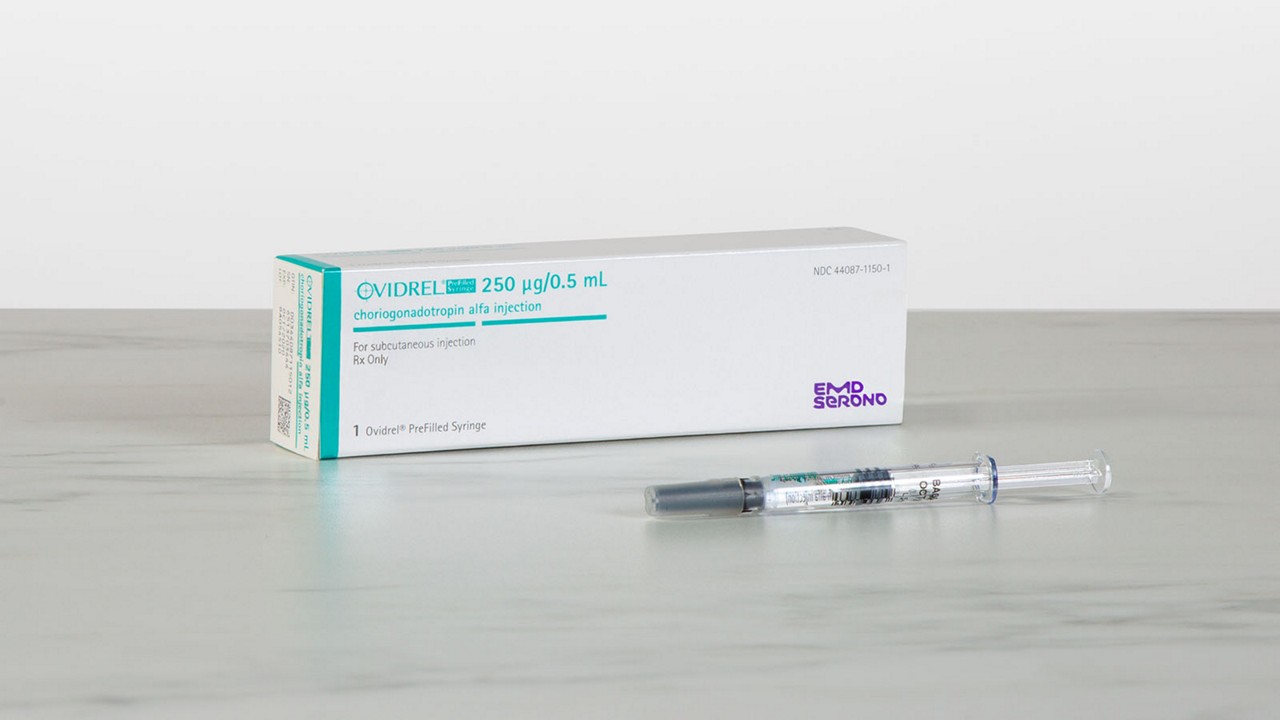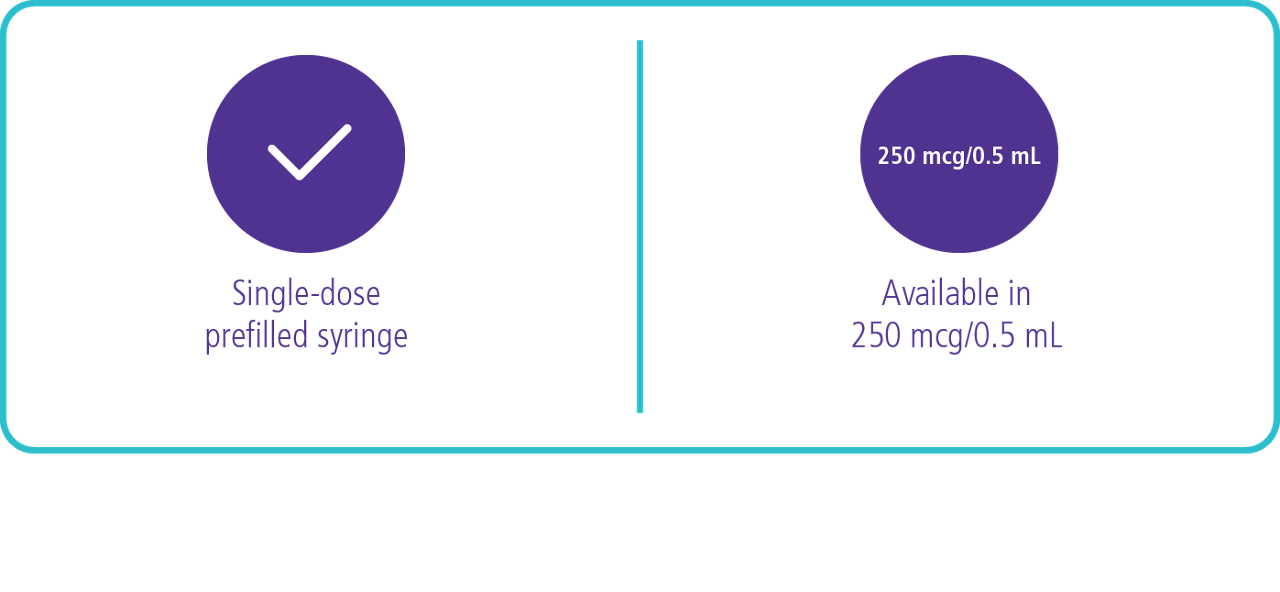The only recombinant hCG available in the US, Ovidrel® has been used with over 3.5 million patients since 20012
Ovidrel® PreFilled Syringe (choriogonadotropin alfa injection) is indicated for the induction of final follicular maturation and early luteinization in infertile women who have undergone pituitary desensitization and who have been appropriately pretreated with follicle stimulating hormones as part of an Assisted Reproductive Technology (ART) program such as in vitro fertilization and embryo transfer. Ovidrel® PreFilled Syringe is also indicated for the induction of ovulation (OI) and pregnancy in anovulatory infertile patients in whom the cause of infertility is functional and not due to primary ovarian failure.


Clinical trial efficacy in OI and ART1
Ovulation induction (OI)
Study design
The safety and efficacy of Ovidrel® 250 μg administered subcutaneously versus 5,000 IU of an approved urinary-derived hCG product administered intramuscularly were assessed in a double-blind, randomized, multicenter study in anovulatory infertile women (Study 8209) which was conducted in 19 centers in Australia, Canada, Europe and Israel.
The primary efficacy parameter in this single-cycle study was the patient ovulation rate. 242 patients entered the study, of whom 99 received Ovidrel® 250 μg. The efficacy of Ovidrel® 250 μg was found to be clinically and statistically equivalent to that of the approved urinary-derived hCG product. The results of those patients who received Ovidrel® 250 μg are summarized below.
Results with Ovidrel®
The efficacy of Ovidrel® 250 μg was found to be clinically and statistically equivalent to that of the approved urinary-derived hCG product.
Efficacy Outcomes of r-hCG in OI (Study 8209)
| Parameter | Ovidrel® 250 μg (n=99) |
| Ovulation Rate | 91 (91.9%) |
| Clinical Pregnancy Rateî | 22 (22%) |
îClinical pregnancy was defined as a pregnancy during which a fetal sac (with or without heartbeat activity) was detected by ultrasound on day 35-42 after hCG administration.
For the 22 patients who had a clinical pregnancy with Ovidrel® 250 μg, the outcome of the pregnancy is presented in Table 8.
Pregnancy Outcomes of r-hCG in OI (Study 8209)
| Parameter | Ovidrel® 250 μg (n=22) |
| Clinical Pregnancies not reaching term | (31.8%) |
| Live births | 15 (68.2%) |
| Singleton | 13 (86.7%) |
| Multiple birth | 2 (13.3%) |
The following common adverse reactions were reported in OI clinical trials.
Body System | Ovidrel® 250 (N=99) |
At least one adverse event | 26.2% (26) |
Application site disorders | 16.2% (16) |
Injection site pain | 8.1% (8) |
Injection site inflammation | 2.0% (2) |
Injection site bruising | 3.0% (3) |
Injection site reaction | 3.0% (3) |
Reproductive disorders, female | 7.1% (7) |
Ovarian cyst | 3.0% (3) |
Ovarian hyperstimulation | 3.0% (3) |
Gastrointestinal system disorders | 4.0% (4) |
Abdominal pain | 3.0% (3) |
Assisted reproductive technology (ART)
Study design
The safety and efficacy of Ovidrel® 250 μg and Ovidrel® 500 μg administered subcutaneously versus 10,000 USP Units of an approved urinary-derived hCG product administered intramuscularly were assessed in a randomized, open-label, multicenter study in infertile women undergoing in vitro fertilization and embryo transfer (Study 7927). The study was conducted in 20 U.S. centers.
The primary efficacy parameter in this single-cycle study was the number of oocytes retrieved. 297 patients entered the study, of whom 94 were randomized to receive Ovidrel® 250 μg. The number of oocytes retrieved was similar for the Ovidrel® and urinary-derived hCG (10,000 USP Units) treatment groups. The efficacy of Ovidrel® 250 μg and Ovidrel® 500 μg were both found to be clinically and statistically equivalent to that of the approved urinary-derived hCG product and to each other. The efficacy results for the patients who received Ovidrel® 250 μg are summarized below.
Results with Ovidrel®
| Study Outcome | Ovidrel® 250 μg (n=94) |
Mean number of oocytes retrieved per patient | 13.60 |
Mean number of mature oocytes retrieved per patient | 7.6 |
Mean number of 2 PN fertilized oocytes per patient | 7.2 |
Mean number of 2 PN or cleaved embryos per patient | 7.6 |
Implantation rate per embryo transferred (%) | 18.7% |
| Mean mid-luteal serum progesterone levels (nmo/L)a | 423 |
Clinical pregnancy rate per initiated treatment cycle (%)b | 35.1% |
Clinical pregnancy rate per transfer (%)b | 36.3% |
a nmo/L ÷ 3.18 = ng/mL.
b Clinical pregnancy was defined as a pregnancy during which a fetal sac (with or without heartbeat activity) was detected by ultrasound on day 35-42 after hCG administration.
For the 33 patients who achieved a clinical pregnancy with Ovidrel® 250 μg, the outcomes of the pregnancies were
- 4 (12.1%) clinical pregnancies did not reach term
- 29 (87.9%) live births
- 20 (69.0%) singletons
- 9 (31%) multiple births
Study design
The safety and efficacy of Ovidrel® 250 μg administered subcutaneously versus 5,000 IU of an approved urinary-derived hCG product administered subcutaneously were assessed in a second, randomized, multicenter study in infertile women undergoing in vitro fertilization and embryo transfer (Study 7648). This double-blinded study was conducted in nine centers in Europe and Israel.
The primary efficacy parameter in this single-cycle study was the number of oocytes retrieved per patient. 205 patients entered the study, of whom 97 received Ovidrel® 250 μg. The efficacy of Ovidrel® 250 μg was found to be clinically and statistically equivalent to that of the approved urinary-derived hCG product. The results for the 97 patients who received Ovidrel® 250 μg are summarized below.
Results with Ovidrel®
Study Outcome | Ovidrel® 250 μg (n=97) |
| Mean number of oocytes retrieved per patient
| 10.6 |
| Mean number of mature oocytes retrieved per patient
| 10.1 |
| Mean number of 2 PN fertilized oocytes per patient
| 5.7 |
| Mean number of 2 PN or cleaved embryos per patient
| 5.1 |
| Implantation rate per embryo transferred (%)
| 17.4% |
| Mean mid-luteal serum progesterone levels (nmo/L)a
| 394 |
| Clinical pregnancy rate per initiated treatment cycle (%)b
| 33% |
| Clinical pregnancy rate per transfer (%)b
| 37.6% |
a nmo/L ÷ 3.18 = ng/mL.
b Clinical pregnancy was defined as a pregnancy during which a fetal sac (with or without heartbeat activity) was detected by ultrasound on day 35-42 after hCG administration.
For the 32 patients who achieved a clinical pregnancy with Ovidrel® 250 μg, the outcomes were:
- 6 (18.8%) clinical pregnancies did not reach term
- 26 (81.2%) live births
- 18 (69.2%) singletons
- 8 (30.8%) multiple births
The following common adverse reactions were reported in ART clinical trials, Studies 7648, 7927, 9073.
Body System | Ovidrel® 250 μg (N=236) Incidence Rate % (n) |
At least one adverse event | 33.1% (78) |
Application site disorders | 14.0% (33) |
Injection site pain | 7.6% (18) |
Injection site bruising | 4.7% (11) |
Gastrointestinal studies disorders | 8.5% (20) |
Abdominal pain | 4.2% (10) |
Nausea | 3.4% (8) |
Vomiting | 2.5% (6) |
Secondary terms (post-operative pain) | 4.7% (11) |
Post-operative pain | 4.7% (11) |
References
1. Ovidrel® (choriogonadotropin alfa injection) [Prescribing Information]. Rockland, MA: EMD Serono, Inc.; 2018.
2. Data on file. Rockland, MA: EMD Serono, Inc.
IMPORTANT RISK INFORMATION & INDICATIONS AND USAGE
Important Risk Information for Ovidrel® PreFilled Syringe (choriogonadotropin alfa injection)
Ovidrel® PreFilled Syringe should only be used by physicians who are experienced with infertility problems, their management and appropriate selection and monitoring of patients. Ovidrel® PreFilled Syringe is contraindicated in women who exhibit prior sensitivity to hCG preparations, mannitol, or one of their other excipients, primary ovarian failure, uncontrolled thyroid or adrenal dysfunction, an uncontrolled intracranial lesion, abnormal uterine bleeding of an undetermined origin, an ovarian cyst or enlargement of an undetermined origin. Women who are pregnant or nursing should not use Ovidrel® PreFilled Syringe.
Ovidrel® PreFilled Syringe is a potent gonadotropic substance capable of causing Ovarian Hyperstimulation Syndrome (OHSS) and ovarian enlargement with or without pulmonary and vascular complications. Adverse reactions reported include injection site reactions, GI disorders, abdominal pain, nausea, vomiting, ovarian cyst, ovarian hyperstimulation, and thromboembolic events. Multiple births and congenital abnormalities have been reported.
Indication
Ovidrel® PreFilled Syringe (choriogonadotropin alfa injection) is indicated for the induction of final follicular maturation and early luteinization in infertile women who have undergone pituitary desensitization and who have been appropriately pretreated with follicle stimulating hormones as part of an Assisted Reproductive Technology (ART) program such as in vitro fertilization (IVF) and embryo transfer. Ovidrel® PreFilled Syringe is also indicated for the induction of ovulation (OI) and pregnancy in anovulatory infertile patients in whom the cause of infertility is functional and not due to primary ovarian failure.
![]() For complete information, please see full Prescribing information here.
For complete information, please see full Prescribing information here.
IMPORTANT RISK INFORMATION & INDICATIONS AND USAGE
Important Risk Information for Ovidrel® PreFilled Syringe (choriogonadotropin alfa injection)
Ovidrel® PreFilled Syringe should only be used by physicians who are experienced with infertility problems, their management and appropriate selection and monitoring of patients. Ovidrel® PreFilled Syringe is contraindicated in women who exhibit prior sensitivity to hCG preparations, mannitol, or one of their other excipients, primary ovarian failure, uncontrolled thyroid or adrenal dysfunction, an uncontrolled intracranial lesion, abnormal uterine bleeding of an undetermined origin, an ovarian cyst or enlargement of an undetermined origin. Women who are pregnant or nursing should not use Ovidrel® PreFilled Syringe.
Ovidrel® PreFilled Syringe is a potent gonadotropic substance capable of causing Ovarian Hyperstimulation Syndrome (OHSS) and ovarian enlargement with or without pulmonary and vascular complications. Adverse reactions reported include injection site reactions, GI disorders, abdominal pain, nausea, vomiting, ovarian cyst, ovarian hyperstimulation, and thromboembolic events. Multiple births and congenital abnormalities have been reported.
Indication
Ovidrel® PreFilled Syringe (choriogonadotropin alfa injection) is indicated for the induction of final follicular maturation and early luteinization in infertile women who have undergone pituitary desensitization and who have been appropriately pretreated with follicle stimulating hormones as part of an Assisted Reproductive Technology (ART) program such as in vitro fertilization (IVF) and embryo transfer. Ovidrel® PreFilled Syringe is also indicated for the induction of ovulation (OI) and pregnancy in anovulatory infertile patients in whom the cause of infertility is functional and not due to primary ovarian failure.
![]() For complete information, please see full Prescribing information here.
For complete information, please see full Prescribing information here.


